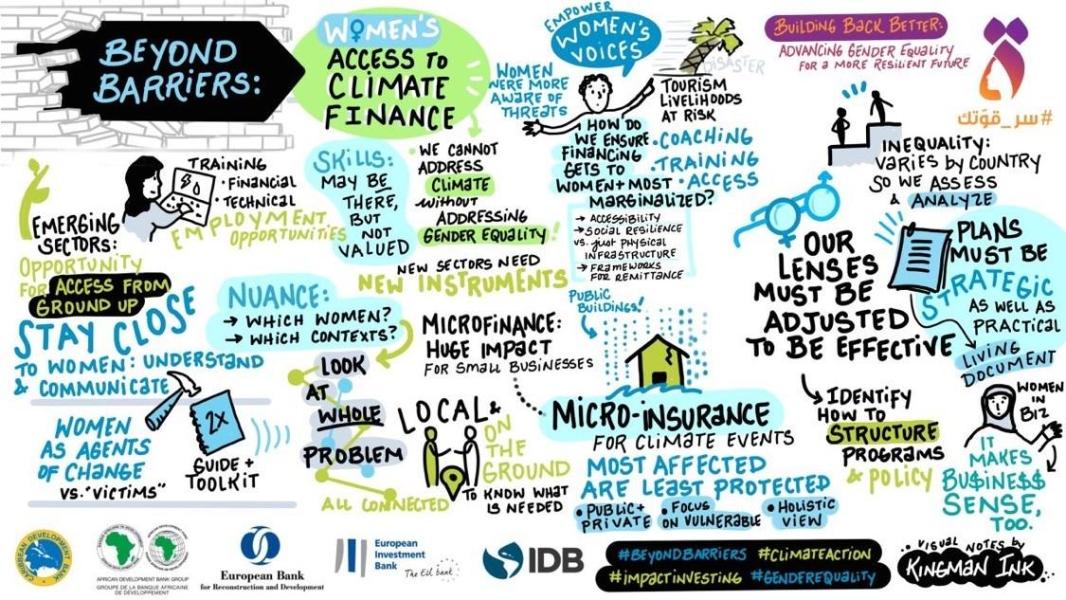
From 16-19 May 2022 in Cairo, Egypt, the EIB and the Islamic Development Bank (IsDB) hosted the 2022 Global Gender Summit of the Multilateral Development Banks (MDB) Working Group on Gender (WGG), under the patronage of the Egyptian Ministry of International Cooperation, the Egyptian Ministry of Planning and Economic Development, and Egypt’s National Council for Women.
Supported by a group of 11 Multilateral Development Banks, the summit provided a platform for experts, policy makers and development practitioners, to discuss concrete ways to advance gender equality, particularly with regards to employment and the care economy; digitalization ; and climate action, ahead of the UN Climate Change Conference 2022 (COP 27) hosted by the Egyptian Government later this year.
The summit was opened by Her Excellency Dr. Rania A. Al-Mashat, Minister of International Cooperation, Dr. Maya Morsy, President of Egypt’s National Council for Women, Dr. Ahmed Kamaly, Deputy Minister of the Ministry of Planning & Economic Development, EIB Vice-President Ambroise Fayolle, and Dr. Mansur Muhtar, Vice President Operations of the Islamic Development Bank.
Through several sessions organized by the Asian Development Bank (ADB), the Asian Infrastructure Investment Bank (AIIB), the Inter-American Development Bank (IADB), the International Finance Corporation (IFC), the International Monetary Fund (IMF), and the World Bank (WB), the first day of the summit dived into opportunities to create decent jobs and accelerate women’s empowerment at work.
It presented the impacts of the COVID-19 on female employment, in terms of job loss and quality of employment, and highlighted policy responses to support the creation of ‘good’ jobs and to enhance gender equality in the future of work. Special focus was given to the care economy, including care policies, such as family-friendly policies, with good practices shared from the private and public sectors, civil society, and investors. The last session explored fiscal policies that can help support participation of women in the labor force, notably through taxation, procurement and expenditure.
The second day of the summit, organized by the European Bank for Reconstruction and Development (EBRD), the Caribbean Development Bank (CDB), The Asian Development Bank (ADB), the African Development Bank (AfDB), and the EIB was dedicated to climate action and gender equality. Notably this day benefited from high-level panelists including Egypt’s Minister of Environment (Her Excellency Dr. Yasmine Fouad), the President of Egypt’s National Council for Women, and Indonesia’s Deputy Minister for Women’s Empowerment (Lenny Rosalin), the G20 2022 Host Country. Discussions offered solutions to drive sustainable inclusion, notably by increasing women’s access to climate finance and boosting their skills so they can better participate in the green economy. In this context, the CEO of the 2XCollaborative, the global gender-lens investing industry body, highlighted the launch of the 2X Gender-Smart Climate Finance Guide at COP26 which EIB had produced in partnership with EBRD and British International Investment. Panelists shared concrete examples of gender-smart climate investments, such as the BlueOrchard InsuResilience Investment Fund or Climate Finance and Gender Equality in the Caribbean, that promote gender equality in green finance. EIB Director Maria Shaw-Barragan highlighted EIB’s triple nexus approach to climate, gender & fragility. The final session discussed the way forward towards Gender Day at COP27.
The last day of the summit, led by the International Monetary Fund (IMF), the European Bank for Reconstruction and Development (EBRD), the International Finance Corporation (IFC), the African Development Bank (AfDB), and the Islamic Development Bank (IsDB), focused on the opportunities brought by digitalization. Financial sector representatives and practitioners shared best practices and studies to leverage digital financial services and fintech to boost women’s financial inclusion. Here the insights of central bankers from Egypt and Pakistan as well as the Alliance for Financial Inclusion, the Better than Cash Alliance, and UN Women stressed the importance of gender-targeted policies and gender-disaggregated data collection. The final session shed a light on the crucial role that digitalization can play in particular situations of fragility and conflicts affecting women.
The vast variety of speakers who took the floor during the three-day summit, from the private sector, International Financial Institutions and international organisations such as the International Labour Organization, governments, municipalities, and Non Profit Organizations, enriched a truly global event with their expertise and experience. This summit provided a unique platform to discuss challenges and solutions to achieve gender equality and boost resilience and climate action, ahead of COP27.
As chair of the MDB Working Group on Gender and co-host of this summit, the EIB would like to warmly thank all the co-organisers, participants and attendees who made this event a success.
More information on the 2022 Global Gender Summit of the Multilateral Development Banks.
Note:
1 The Asian Development Bank (ADB), the African Development Bank (AfDB), the Asian Infrastructure Investment Bank (AIIB), the Caribbean Development Bank (CDB), the European Bank for Reconstruction and Development (EBRD), the European Investment Bank (EIB), the Inter-American Development Bank (IADB), IDB Invest, the International Finance Corporation (IFC), the International Monetary Fund (IMF), the Islamic Development Bank (IsDB) and the World Bank (WB).

©MDBWG
Download original

©MDBWG
Download original

©MDBWG
Download original

©MDBWG
Download original